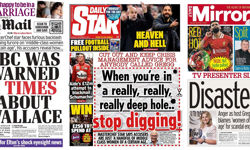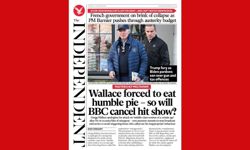Like so many other things in life, panic blows west to east across the Atlantic. Doom and gloom over the death of newspapers afflicted America first, then headed for Britain and Europe in a second wave. And most of the answers to crisis, real or alleged, start in the United States, too. Take the end of investigative journalism as we know it, abandoned by papers supposedly too cash-strapped to investigate any more. Then - as all good journalists should do anyway - take a closer look.
On the surface, you can see many similarities: big local chains who borrowed too much when the good times rolled, who now must cut and cut again, carving away the merest hint of editorial fat. How do you give a reporter a week or a month to dig up exclusive stories when page after page has to be filled at the double? And similarly, in an adjacent part of the forest, how do television companies like ITV or Channel 4 afford undercover camera teams following the wheels that turn inside immigration smuggling, say, or tracking what happens to the aid we send to Kabul? Big projects, small audience. Bring on the panel games and the hired Hollywood series. Bury the ghosts of World in Action. These seem barren years for turning over stones.
Foundation funding
More, the response to them appears pretty identical too. America, used to private foundation funding of art and music, automatically reaches for that model and begins to find dozens of charities with cash who will pay to set investigation units underway in the name of public service. ProPublica, perhaps the most famous investigative website of them all, has a $10 million annual foundation grant to keep it - and now 28 staff - exploring stories in depth and making its conclusions available to any participating paper or broadcasting station willing to publish.
ProPublica, and several university-based operations, does splendid work. You can't criticise the zeal, the motives or the professionalism involved. Perhaps America's papers and TV networks have cut resources close to the bone, but they've found other ways to fulfil their investigative "mission", other people to foot the bills. "I mean, a lot of science here is funded by non-profits, schools are non-profits, so there's no reason why journalism can't be non-profit too", according to Jonathan Glick, the founding father of the New York Times Online.
And Britain's own investigative experts, clustered around the Centre for Investigative Journalism at the City University in London, are following much the same model. The Centre trains young and sometimes mid-career reporters from all over the world in the skills of investigative reporting, often via twenty short, intensive courses (500 or so have learned about reading company accounts, activating freedom of information requests and the most modern internet research techniques already). A few months ago, however, a foundation came calling US-style. Elaine Potter, a former Sunday Times reporter who married David Potter, Psion computer entrepreneur, gave £2 million to a team of Britain's finest - David Leigh, Nick Davies, Martin Bright, Misha Glenny and many more - to set up their own "Bureau for Investigative Journalism" running alongside the City Centre (where Gavin McFadyean, investigative journalist turned professor, is busy raising another £2 million). So expect a stream of revelations to start flowing any time soon.
Doom & gloom
But pause, as well, because it's also necessary to chart Britain's differences from the American scene: not merely in the structure of the newspaper and broadcasting industries, but also in where they instinctively look for help. And there's a real difficulty in pinning down not just the extent of the decline in investigative reporting, but also the circumstances where it may be helped to flourish best.
Professor McFadyean waxes hot and strong about the extent of decline. He takes a benchmark some 25 years back and runs dolefully through the investigative zest that's vanished with time: no more World in Action (a constant refrain), no full length Panorama, precious few bloodhounds working for any national paper, a few great names not able to show what they can do in a world with no lush budgets left and an oppressive fear of libel lawyers coming to strip existing budgets bare.
Remember, remember the wondrous Sunday Times of thirty years back, invoked yet again in Harold Evans's new autobiography. It's a desolate landscape, on this reckoning. But perhaps such desolation can be overdone.
Signs of life
There's no need to guess which paper and which story will win the big awards in this winter's ceremonies. The Telegraph is a shoo-in for paper of the year and exclusive of the year. Even in a world where memory of scoops fades fast, those Telegraph weeks of revelations about MPs' expenses have lasting impact. And yet, until last May, the Telegraph had scant reputation for investigating anything. It didn't try very hard or do very much. No longer, though. See what publicity and circulation success week after week of grubby Members of Parliament brought the Barclay brothers. Watch, too, as the Times brings its top investigator back from Washington to try to recover last ground.
Observe how the Guardian ploughs millions into exposing the tax-avoiding ways of giant multinationals - or the ethics-denuded habits of Fleet Street and its private eyes for hire. Study joint Newsnight and Guardian efforts to see who poisoned 30,000 trusting citizens of the Ivory Coast.
In fact, 2009 has been a great year for investigative effort. Over in America, without any help from ProPublica, the Las Vegas Sun won a brilliant Pulitzer prize for exposing the risks and the scandals on the city's building sites: doing, in short, exactly what a diligent local paper ought to do. And the British press - whether exposing the Attorney General's illegal maid servant or highlighting its own short cuts to tabloid glory - has made headlines month after month. Once he's stopped lamenting the long slope of decline, Gavin McFadyean can actually get quite buoyant about the instant enthusiasm infusing his patch.
UK/US structural differences
At which point, it's necessary to get a touch more analytical - and, in particular, to remember America's often forgotten exceptionalism. Put areas of rivalry between the New York Times and Wall Street Journal aside, discount Big Apple attacks by the Post and the News, and what you've got left is essentially a vast land of news franchises operating local or regional monopolies. There is no meaningful competition between papers, so there's no problem in, for example, taking ProPublicas's investigations and filling pages with them. They are "exclusive" in the sense that the audience they attract is geographically exclusive.
That's absolutely not the case in what's left of Fleet Street.
There, competition still comes keen and endemic, both between papers and often, more broadly, between print and broadcasting. A blogger like Guido Fawkes - operating betwixt and between - can publish an exclusive story and expect to see it picked up from the Mail to the BBC News. But an investigative exclusive for the Times - for instance, its long saga examining the treasurer of the Conservative Party a few years ago - won't easily move into other papers or onto the airwaves: which, in turn, means that (from the Sunday Times Insight team on) newspapers and TV programmes have tended to hire their own staff reporters and bind them closely to the editor and news editor sitting just across the room. Their investigations, in short, are not conceived in a vacuum, and then given away or sold to the highest bidder. These investigations are discrete, special, nurtured and umbilical. They're not bought like sweets off a shelf. Rather, they tend to define what the journalism of the Times (or Panorama) is all about. They are award winners, badges of honour, assertions of true public service.
It's this sense of rivalry that may make following the American model rather tricky here. It conditions not just the basic attitudes of editors as they commission investigations, but also a sense of isolation (and some would say, heightened ego) among investigative reporters themselves. They don't work easily in bigger teams. They like to sit away from the hubbub of newsrooms, free to do their own often secretive thing. They can resent an editor's authority just as bitterly as they resent company PRs giving them the run-around. And, of course, they also instinctively resent the wet blanket that often descends on their efforts once a friendly libel lawyer starts working over their copy and wielding a blue pencil.
Libel laws
Never forget that British libel law - and now evolving privacy law - is a hugely stifling, hugely costly impediment to proper investigation, one that the US appears mercifully free from most of the time. Yet again, a ProPublica yarn, properly researched, can be taken on trust and printed, because the First Amendment secures the reader's right to know. In Britain, however, we suffer from something more like a right to keep legal eagles in fine Claret. Every word, every allegation, has to be argued through and justified de novo before publication. It's exceptionally hard to buy complex scoops off the peg.
So these are slightly tremulous times in the investigative game. On the one hand, there's plenty of interest, grassroots fervour and dirt hitting the fan. Perhaps the years of retreat are over. Perhaps - like David Hencke of the Guardian - we're all a little shamefaced that the horror of MPs' expense accounts was missed by so many for so long.
Whatever the crunch, national papers are still excavating, still getting their teeth into rancid tales. And perhaps, too, one foundation will lead to another, and my doubts about self-contained investigative bureaus will prove groundless. Of course, though, nothing in either of those areas is likely to set Britain's shrinking local press digging again. Even if they can afford it, they can't afford the mountain of legal costs that inevitably seems to follow on. And, of course, the fewer ordinary reporters who sit in courts, council chambers and police stations taking notes, the less chance there is of stones turning over in the first place.
Two steps forward, one step back? "I'm not at all concerned that there will be the loss of investigative journalism", Jonathan Glick told one American audience the other day. “I actually find it very funny that people think that's a risk - because it's quite obvious when you meet these folks that they will do it all free.” Investigating is asking and answering questions. And maybe there's no chance that journalists will ever stop doing that.










